What Are the Best Alternatives to Google? How Brands Can Succeed Off Google Search
When I think back to my school days when we were asked to complete research papers using good old-fashioned books from the library, and I genuinely don’t think I could do that today.

When I think back to my school days when we were asked to complete research papers using good old-fashioned books from the library, and I genuinely don’t think I could do that today.
I’ve become so accustomed to the wide accessibility of information on the Internet that I’m willing to do anything to maintain that access, including risking inaccurate information or an inefficient experience.
And I’m not the only one who feels this way.
In HubSpot’s Consumer Trends study surveying more than 700 consumers in January 2024, 78% of consumers said they search for brands online using a search engine like Google, and 79% use search engines like Google to search for answers to questions, as opposed to AI chatbots or social media.
However, only 51% find search engines like Google very effective at answering their questions.
This means many of us blindly use Google because it’s what we know best and not because we think it’s good at what we need it to do. But we don’t need to suffer anymore — there are tons of great search engine options that aren’t Google.
Table of Contents
What to Look For in an Alternative to Google
1. Ad-Free Experience
Google has become quite an oversaturated advertising platform, and it makes sense why. The platform can increase brand awareness by up to 80%, so it’s not shocking that 96% of brands use Google Pay-Per-Click Ads.
While it’s great as a business owner or marketer to use this strategy and can also be beneficial to consumers as a way to discover new brands, I can also sympathize with the frustration of struggling to find the best and quickest answer to a question because I’m bombarded with only slightly relevant links.
Therefore, looking for search engine alternatives that limit the ad experience or support no ads can be ideal to increase the efficiency and efficacy of your search journey.
2. High-Quality Answers
It’s quite interesting to me that, as a society, we’ve developed such a habit of searching queries on Google. After all, in my experience, I rarely receive a direct answer to my questions on this search engine.
Yes, Google can direct me to countless resources that likely have the answers I’m looking for, but it only occasionally populates the best answer when using its AI model Gemini.
I’ve found that Gemini doesn’t always automatically weigh in on my search results, so I then need to skim through various links and select random websites to come to conclusions.
Top search engines should do this work for me by analyzing all the available resources online and offering high-quality answers to my questions.
3. Privacy
Privacy is a real concern for many consumers. 75% of consumers agree that data privacy is a human right and that they should have complete control over how a company uses their data.
While 85% of adults globally want to do more to protect their online privacy using services like Google, 62% believe it’s impossible to go through their daily lives without companies like Google collecting their private data.
There is a way, though, to take more control over your privacy: by using a search engine that emphasizes and specializes in data protection. This is an important consideration when looking for Google alternatives.
4. Special Features
While the main purpose of using a search engine is to search for answers and information, many other traits can set a platform apart from competitors.
For instance, some search engines have an environmental focus and will put ad revenue towards eco-friendly causes, and the same applies to all sorts of charitable causes.
There are also family-friendly search engines, AI search engines, news-focused search engines, and many more options that can align with your interests and needs.
Once you’ve assessed which of these considerations are most important in your review of new search engines, take a look at my list of the best Google alternatives.
What are the best alternatives to Google?
Best Ad-Free or Low-Ad Search Engines
1. Kagi
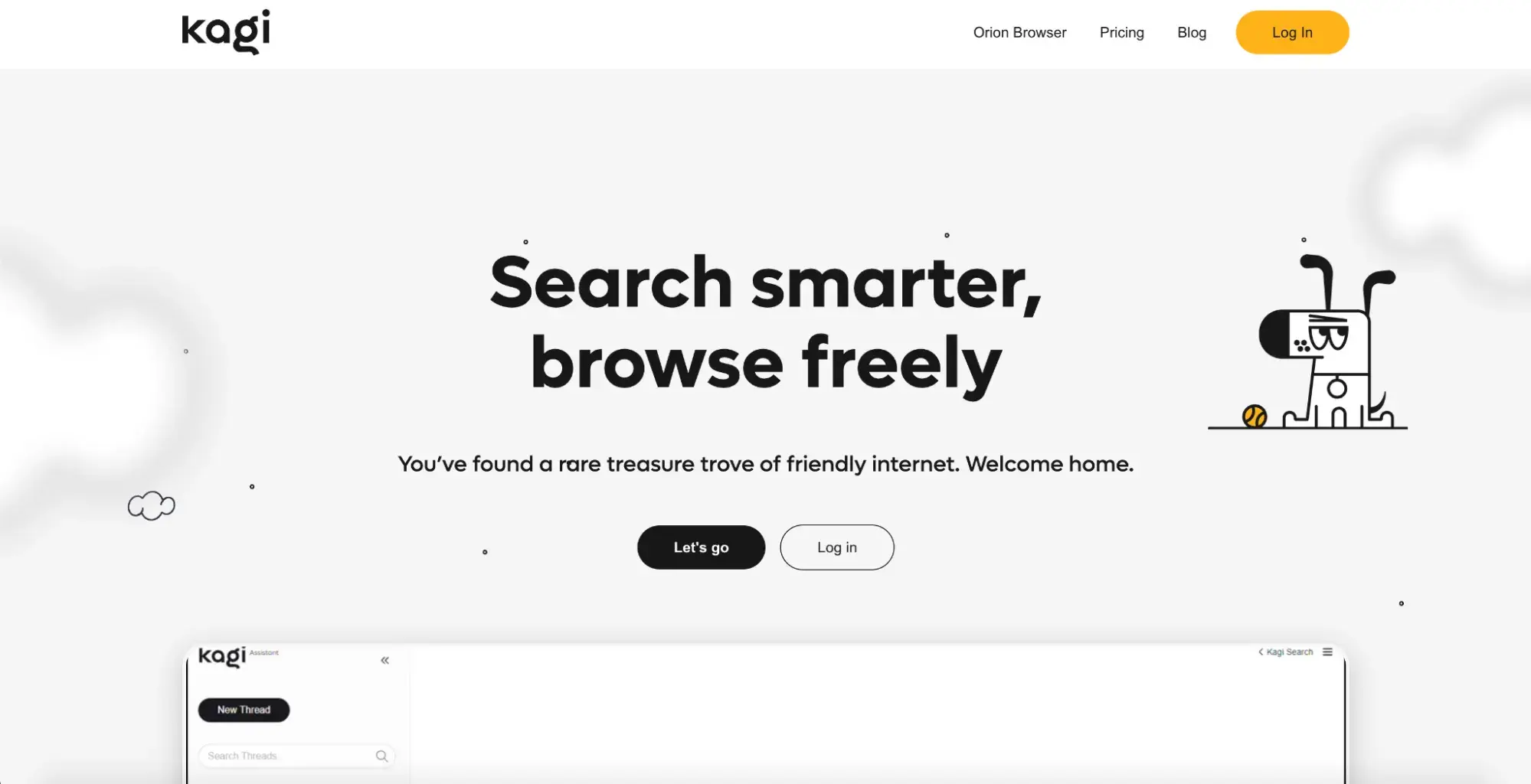
Kagi stresses high-quality, accurate search results without any ads. To maintain its ad-free status, the platform charges a subscription fee of $5 per month which replaces the required revenue to run the platform that would otherwise come from advertising.
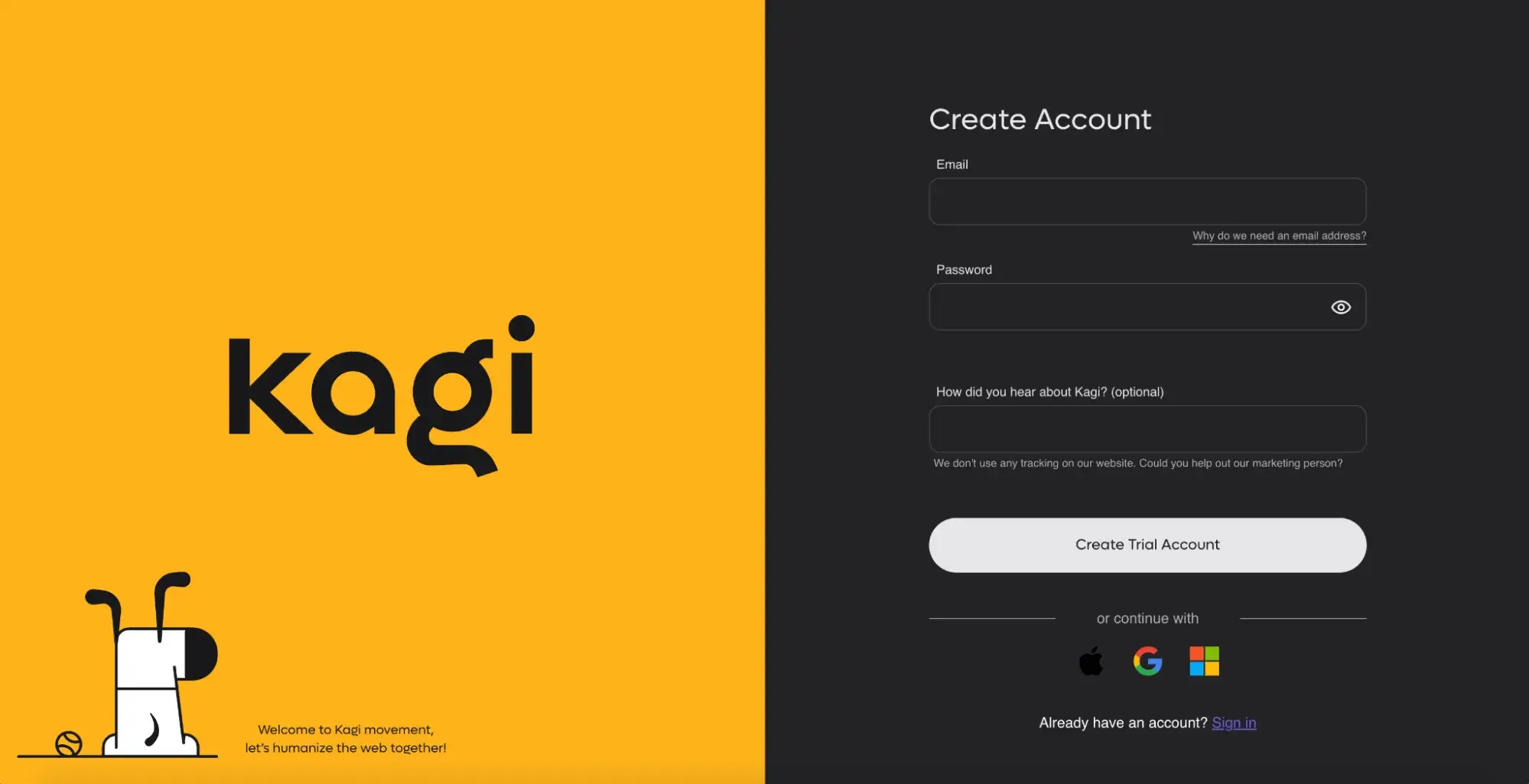
I set up my account and opted for the free trial which allows for 100 search results. Then, I was able to customize the appearance of the search engine in many ways.
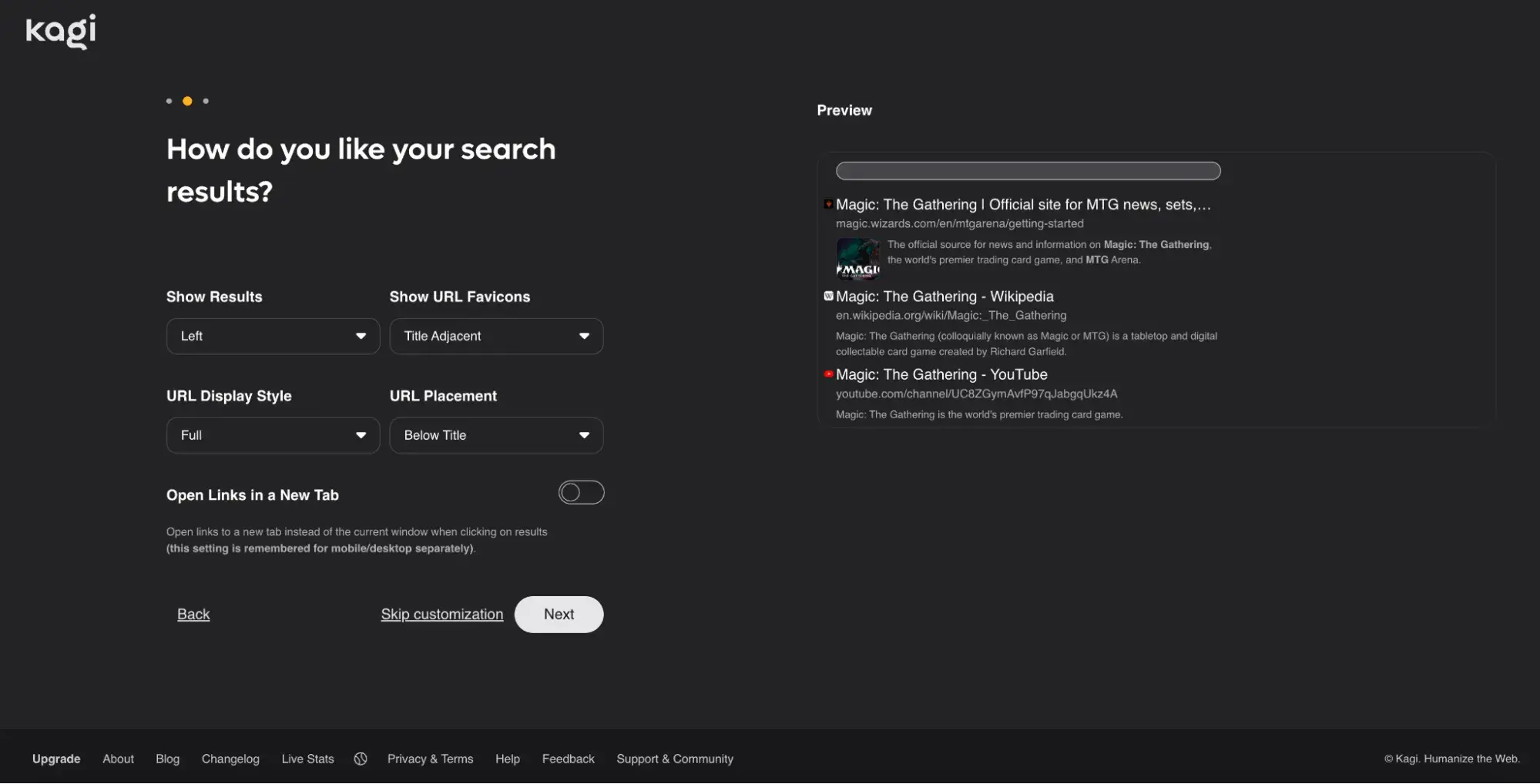
After I updated some of these settings, I searched for my first test question.
What I Like
- Being able to customize my search experience on Kagi is unique. I never realized how much of a difference it makes when I can update whether or not I see the website’s icon or full URL in the search results. This makes Kagi feel very personalized and user-centric.
- The interface closely resembles Google, so it should be easy for users to adapt to this new search engine.
- Rather than click through multiple pages of search results, I just kept scrolling down to see more and more URLs. I enjoyed this, as I’ve realized I often get dissuaded from looking beyond the first page of search results on Google, which limits my results.
- Kagi lists the date the website was published, which quickly helps me decide if it’s appropriate to click on.
What I Don’t Like
- It’s not ideal to have to pay for a subscription, and I’m not sure many people will feel inclined to do so when there are so many free alternatives. However, it makes sense why they have this model, so they can avoid advertising — which is what many other businesses like streaming services do.
Pricing
- Starter plan: $5/month (300 searches per month)
- Professional plan: $10/month (Unlimited searches per month)
- Ultimate plan: $25/month (Unlimited searches + Kagi Assistant)
2. Mojeek
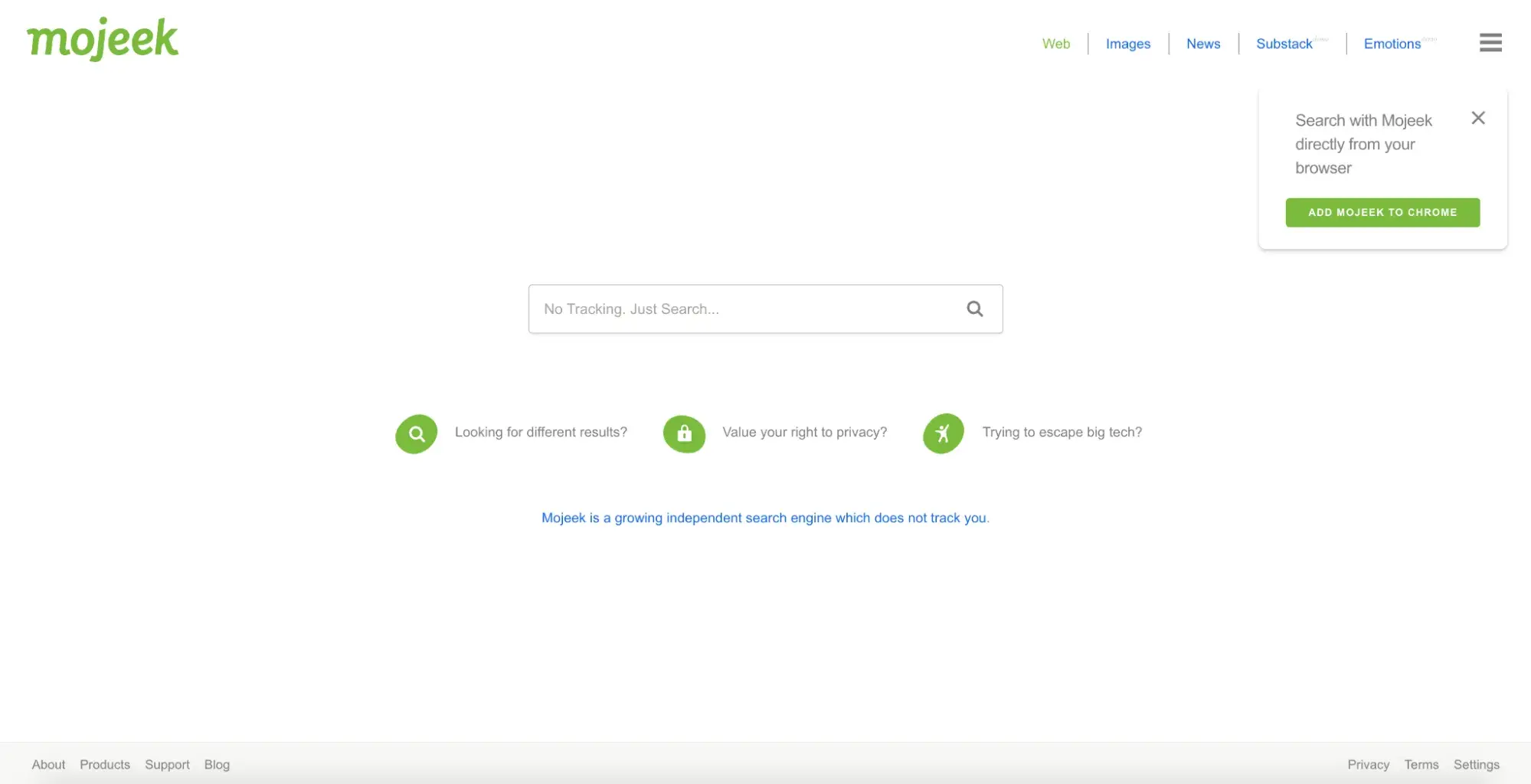
Mojeek is not completely ad-free as it does display some text ads in search results. However, the ads on this platform are based only on search keywords and location and not on any data pulled from the user search engine.
Mojeek is also much less ad-intensive than other search engines, like Google. It has its own web crawler and information index. Unlike Google, Mojeek has an independent ad platform where brands can place ads directly on and separately from major search engines.
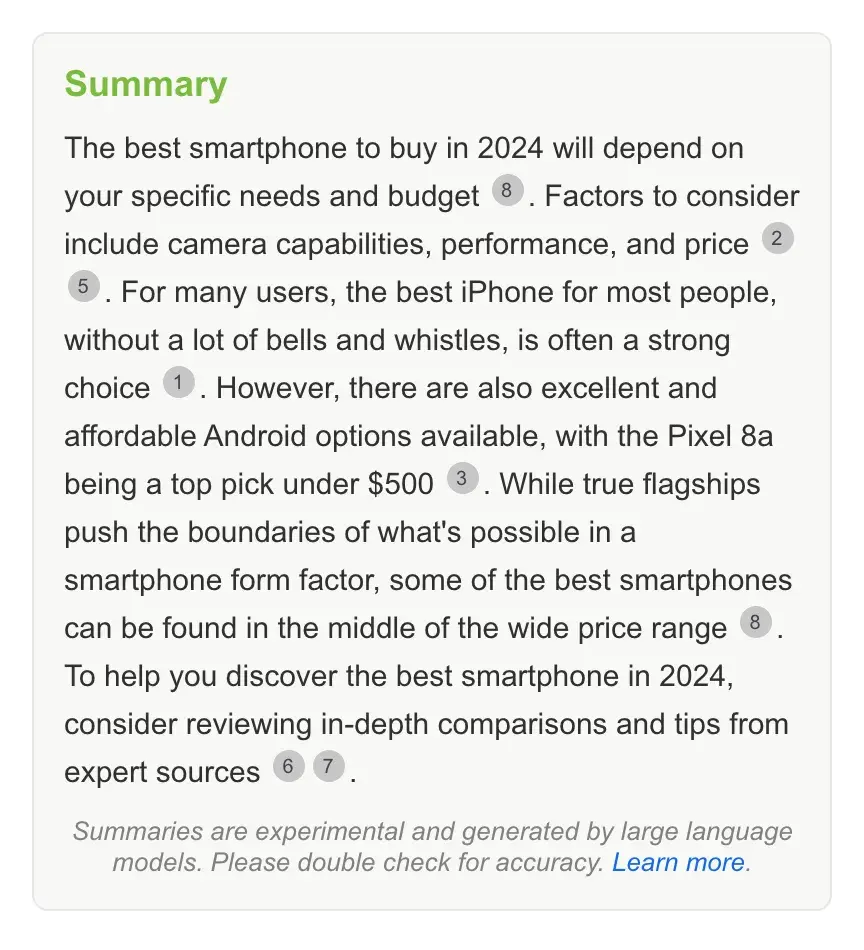
What I Like
- Mojeek is very straightforward and no-nonsense. As soon as I entered this search engine, I could immediately begin searching, so it was quick to learn.
- Its interface also closely resembles Google, making it easily recognizable.
- The “Summarize these results” feature, which shows up on the right side of the screen beside the search results, uses large language models to generate a summary of the search results. This is a great way to incorporate AI for those like me looking for it, while also providing a straight search engine experience for others.
What I Don’t Like
- Mojeek gives options to search the same query with other search engines, such as Brave or Startpage. I found this quite odd as it encourages users to leave Mojeek for competitors.
- Since Mojeek isn’t fully ad-free, I don’t think it’s as impressive an option as Kagi.
Pricing
- Free
Best Search Engines for High-Quality Answers
3. Perplexity
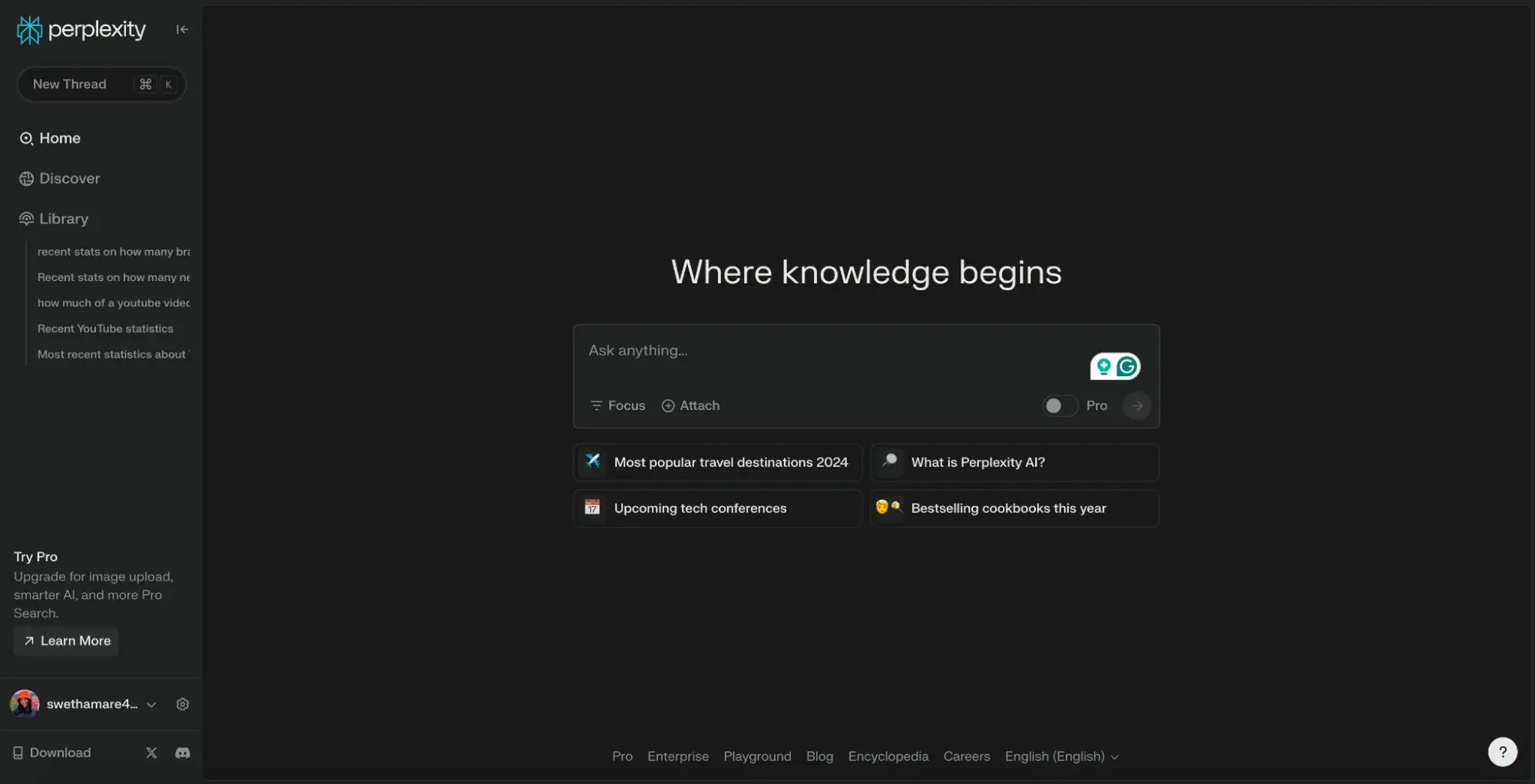
Perplexity is an AI search engine that collects, analyzes, and deconstructs information from various sources to provide a high-quality, human-like response to any question or prompt. It’s more than a regular search engine as its AI power means you don’t need to scroll through and skim various links to answers.
Perplexity combines the communication and synthesis abilities of a chatbot like ChatGPT with a search engine’s web crawling and information-gathering capabilities to provide precise and detailed responses to any prompt.
What makes it a strong Google alternative is that it, too, doesn’t rely on an innate knowledge base but can quickly scour the internet for relevant, related sources to pull together its findings.
What I Like
- The interface is reminiscent of ChatGPT, which is a plus for users like me who have already mastered ChatGPT.
- Despite being an AI search engine, unlike some other Google alternatives on this list, Perplexity does promise accurate answers. It cites sources at the top of each answer and throughout its copy, so I can review the source material myself.
- Compared to regular search engines, Perplexity saves me so much time. It’s way more efficient to receive a straightforward answer rather than clicking through several potentially useful links on Google.
- Since Perplexity is AI-powered, it comprehends my questions and prompts — even when misspelled or grammatically incorrect — much more easily than Google, which regularly needs to ask me “Did you mean...?”
- Perplexity is currently ad-free. While it has plans to introduce ads in the future, it intends to integrate native ads into its “Related Questions” section in a manner that doesn’t disrupt the natural user experience.
What I Don’t Like
- Some of the smarter AI capabilities are only available for Perplexity Pro users.
Pricing
- Standard plan: Free
- Professional plan: $20/month
4. Wolfram Alpha
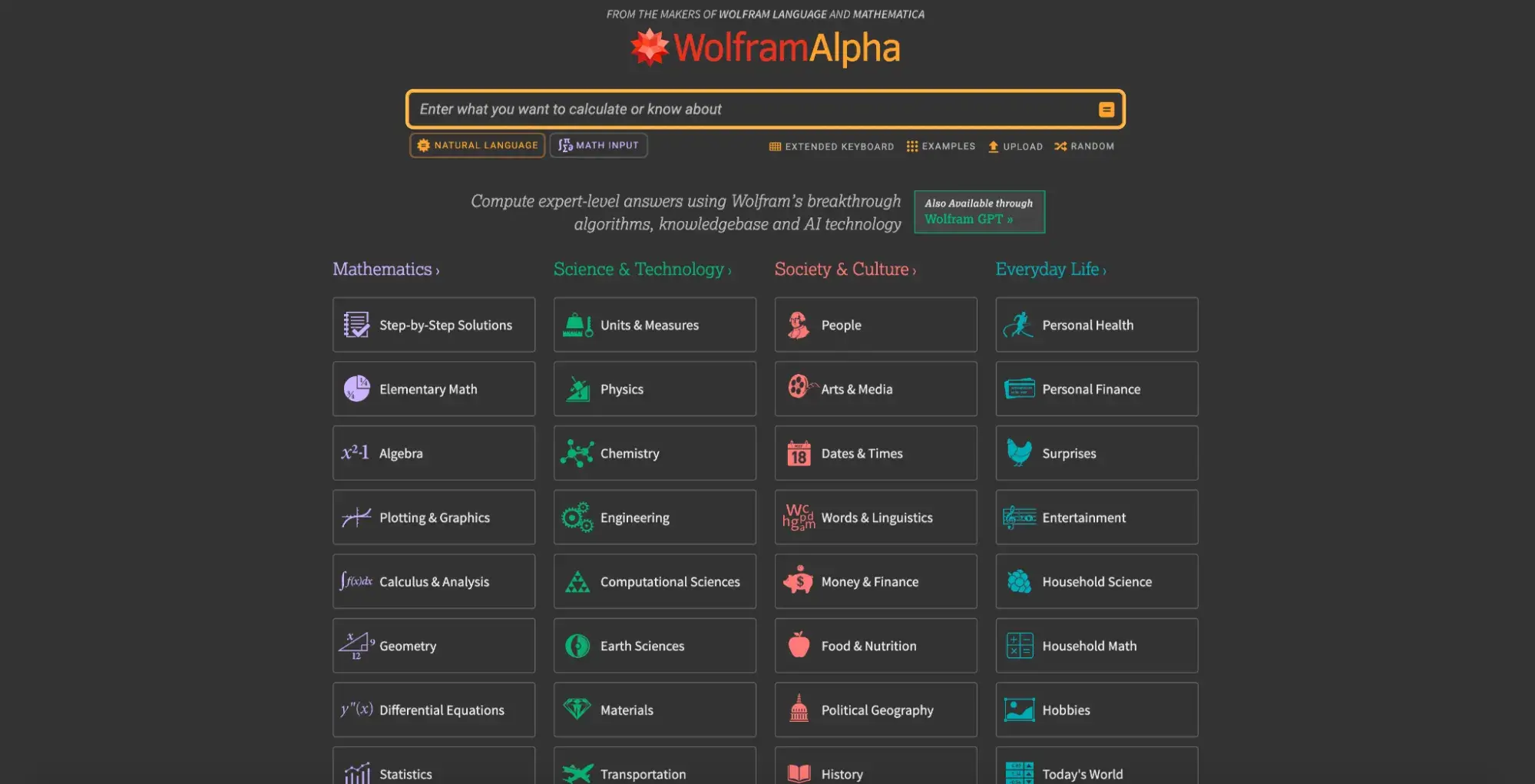
Wolfram Alpha is a search engine that specializes in computational knowledge. It can provide very detailed responses to questions related to data, math, sciences, and other factual topics. For instance, I selected the topic “Food & Nutrition,” as seen below.
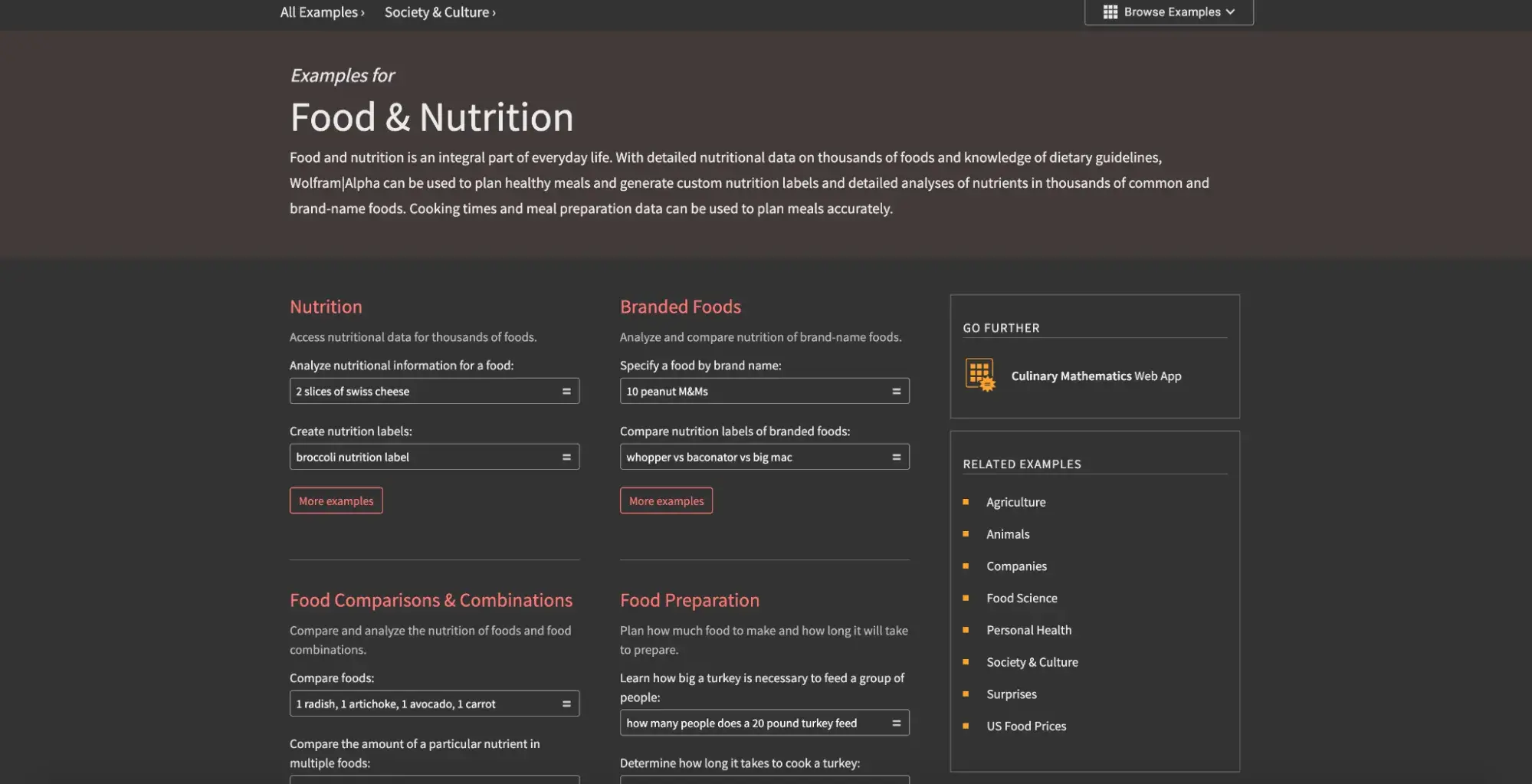
As you can see, this powerful engine can access very specific, detailed information about a wide variety of topics. There is information on this search engine that I never would have even thought to search for.
Since this search engine is so intelligent, I did try searching some basic questions to see how it would handle them. First up, I checked the average rent in New York City.
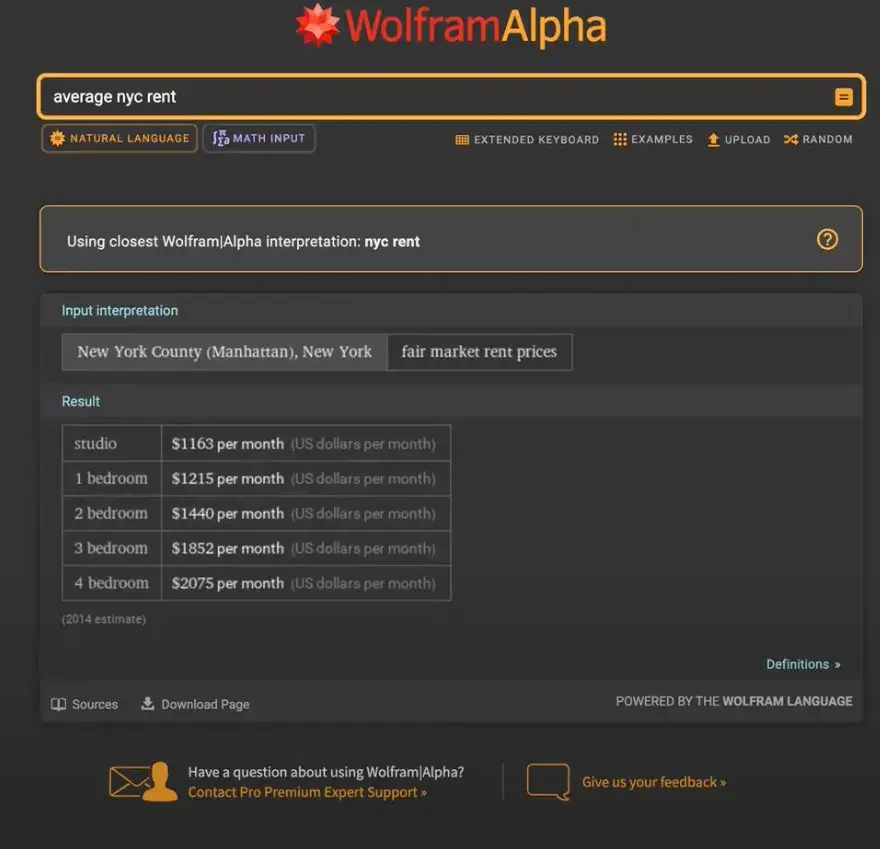
Next, I tried a more niche question that I felt was still computational:

Lastly, I tried something I might most commonly lookup on a search engine like Google, but was left empty-handed:
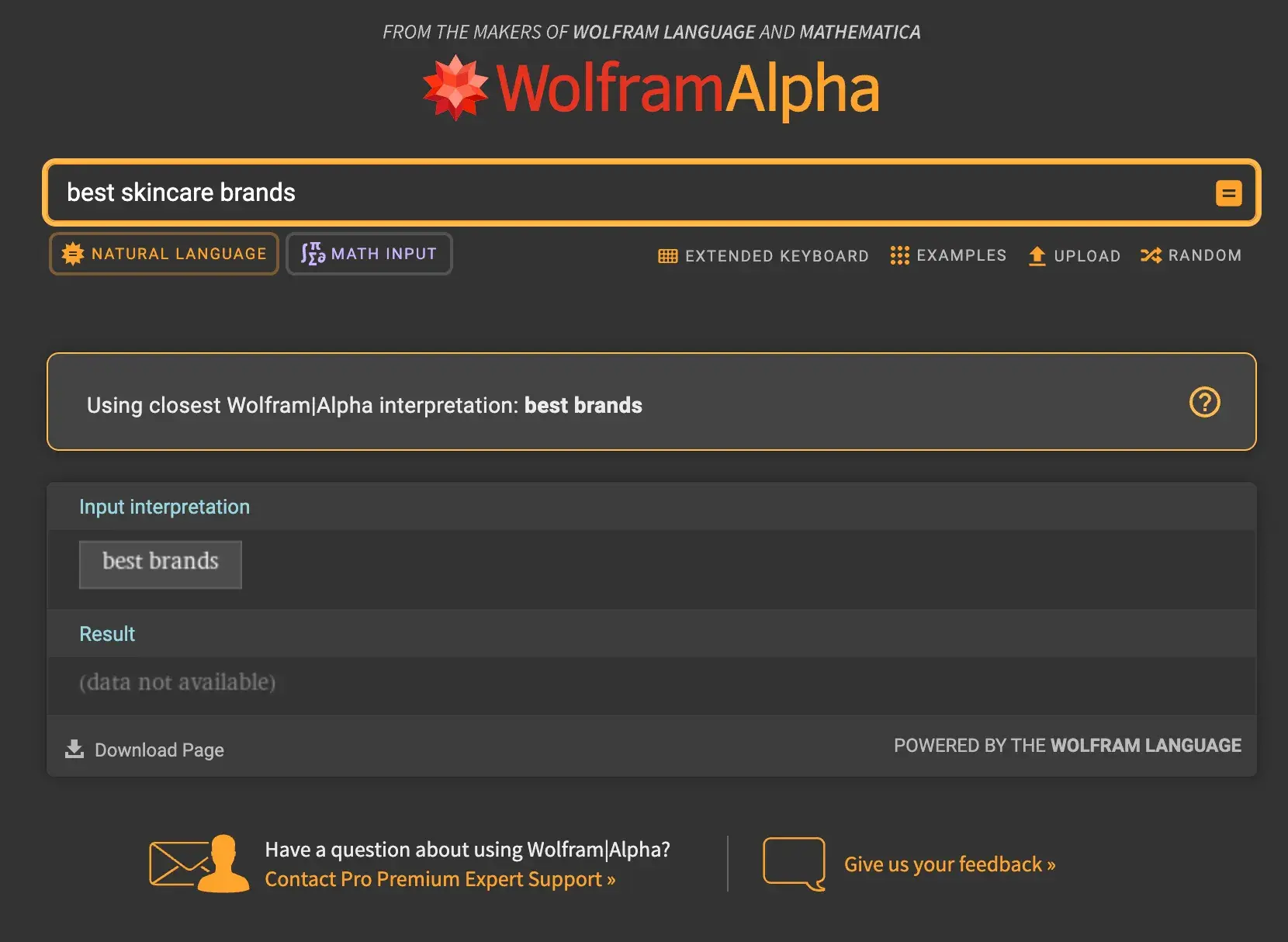
What I Like
- Wolfram Alpha certainly has high-quality answers and a wide range of types of answers. For instance, for “Transportation” I was able to find out total road lengths in any given country, gasoline price data, various computations on airlines, data on any region’s railroad systems, and much more.
- I could choose from a set list of topics when I wasn’t sure what to search for, which helped me hone in on a matter and use the pre-chosen examples to guide my search.
- This search engine would be especially helpful for students, professors, and researchers who need to learn a lot of information about a very specific subject.
What I Don’t Like
- As a regular consumer, this search engine doesn’t provide the answers I may need on a daily basis. It was unable to comprehend most of my basic queries, which are the types of train-of-thought questions I would normally search for on any other search engine.
- It has an outdated appearance along with some blurry visuals.
Pricing
- Basic plan: Free
- Pro plan: $5/month (Includes step-by-step solutions, increased computation time, and calculator Web Apps)
- Pro Premium plan: $8.25/month (All features, including priority customer support)
Best Search Engines for Privacy
5. Startpage
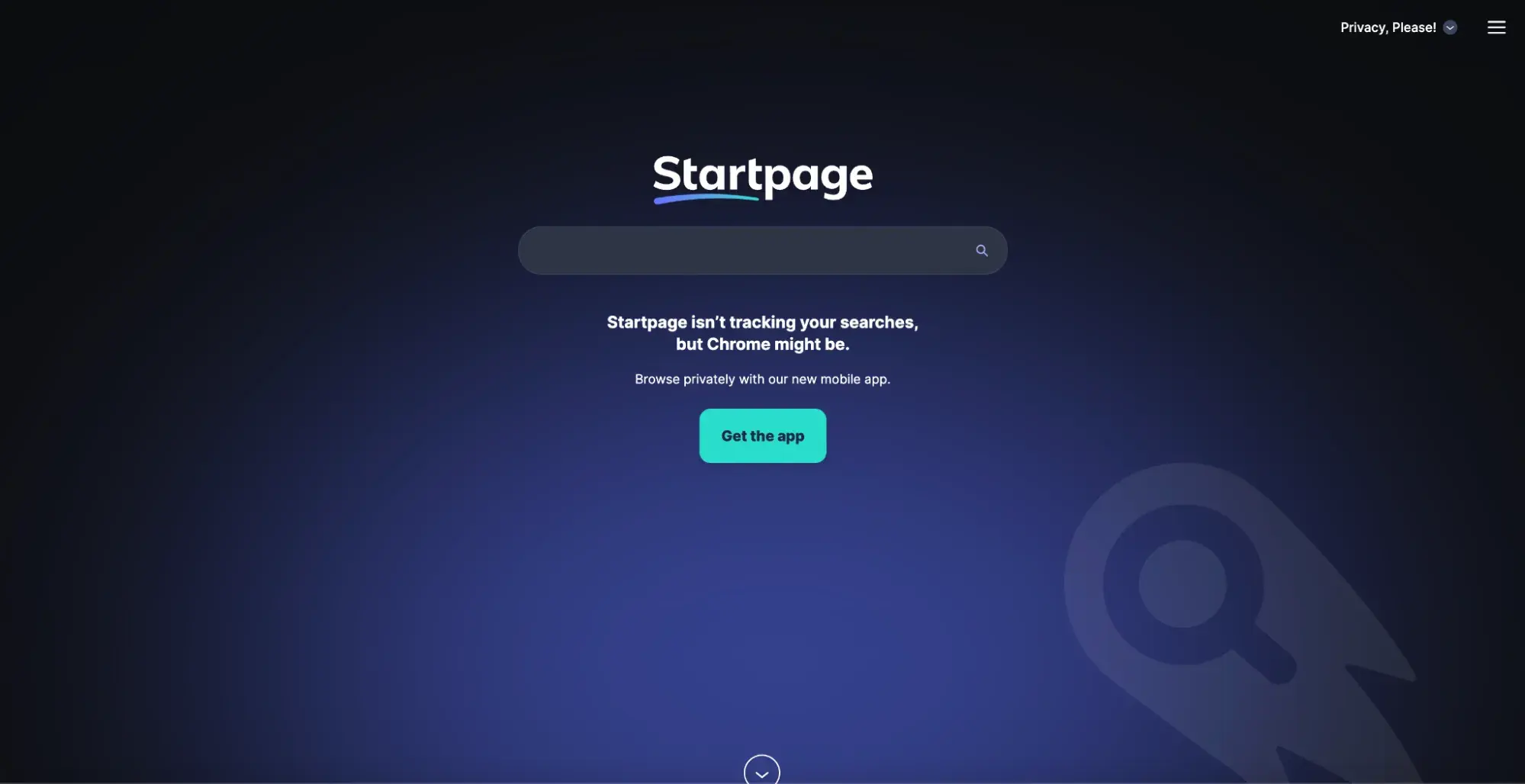
Startpage is unique because it doesn’t have its own index of websites or web crawler. Instead, it acts as a middleman between users and other search engines like Google.
How it works is that it submits your question on your behalf to other search engines, so that you can protect your anonymity. Therefore, you will receive Google and Bing search results while maintaining your privacy from the data tracking practices from which those search engines profit.
It’s basically the equivalent of searching in “incognito mode,” but without the hassle of having to remember to switch that mode on.
What I Like
- Startpage has a very clever privacy model that helps it guarantee no cookies, trackers, website fingerprinting, price tracking or optimization, or social media tracking.
- For users who are having a hard time letting Google go, but want increased privacy, this is the perfect option. You’re still getting the same search results as you would on Google or Bing while having Startpage perform the searching for you as a helpful assistant.
- The interface is modern, sleek, and more attractive than other search engines I reviewed.
What I Don’t Like
- If you’re looking to switch away from Google for any other reason besides privacy concerns, this may not be the option for you, since it’s basically the same platform and search results as Google.
Pricing
- Free
6. Brave Search
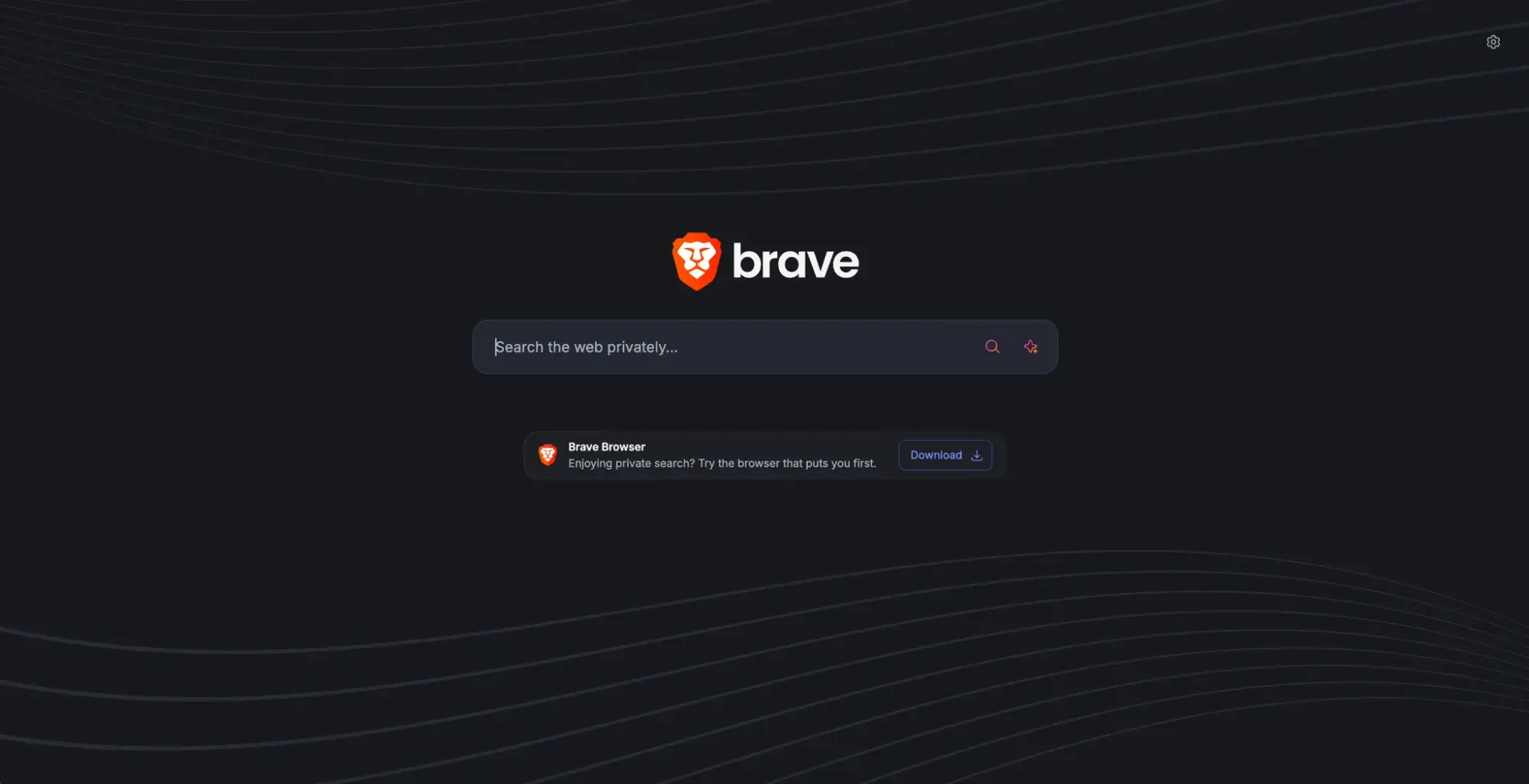
Brave Search boasts security and privacy while browsing the internet, which it manages to do by not tracking users or any of their searches. Brave Search can’t share or sell personal data because it never gets collected in the first place.
This is helpful for those who work from public computers or networks. It can also be attractive to those interested in both privacy and AI, as the platform introduced Answer with AI earlier this year. This feature has quickly become one of the largest AI solutions.
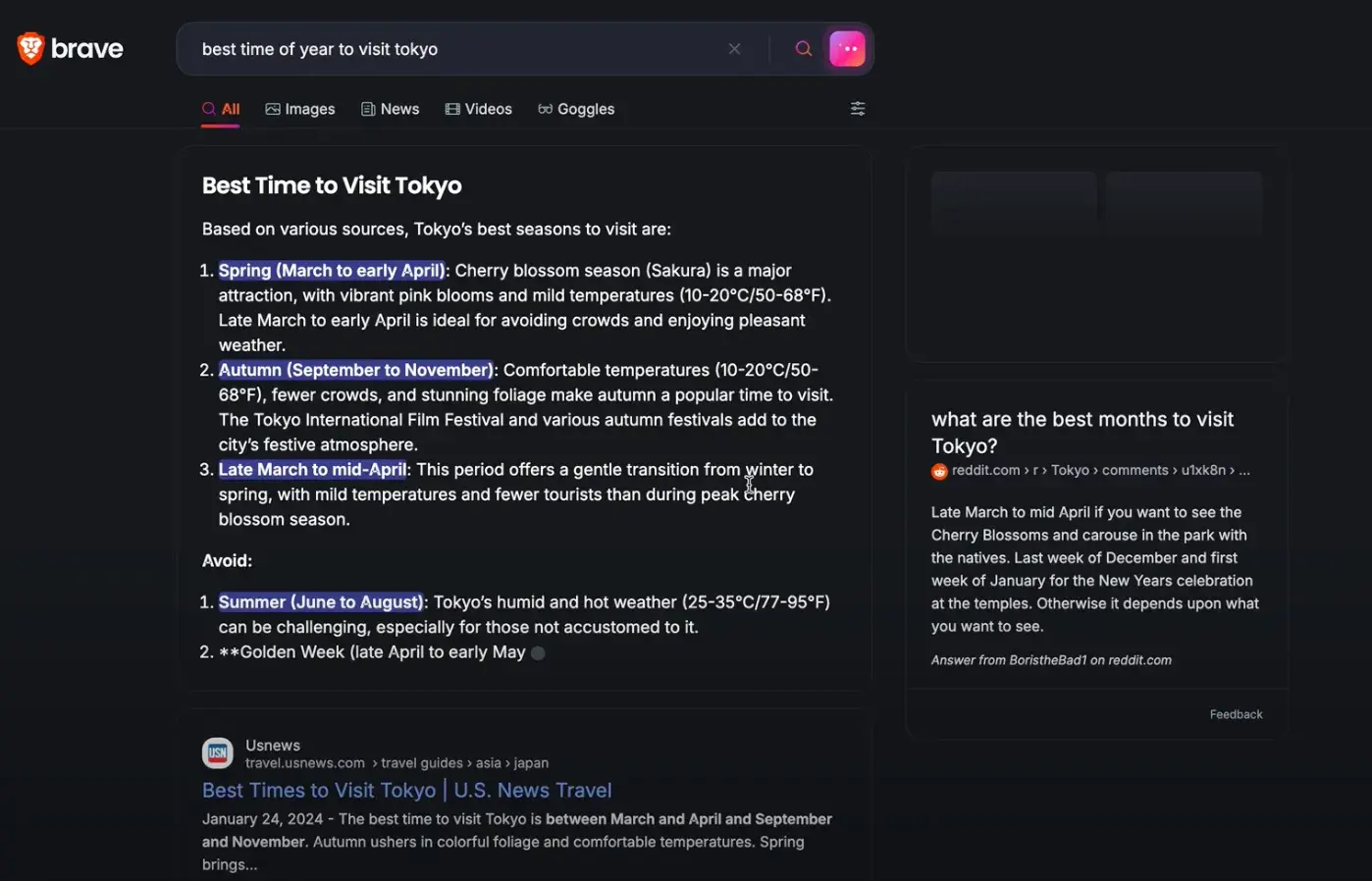
What I Like
- Brave Search has a standard appearance similar to other search engine options on this list and major ones like Google.
- It prioritizes privacy with a fail-proof strategy that allows for complete user protection while still using its own independent web crawler and index.
- The AI assistant, when able to be used, is very intelligent and good at summarizing the many search results into a cohesive response.
- While Brave Search does support paid ads, it guarantees that the ads are designed to be anonymous and that the platform won’t report any user data if users view or click on the ads.
What I Don’t Like
- Answer with AI is not available for all queries, which was a bit disappointing for me. For instance, I searched “best large, leak-free water bottles” and was told that AI was “unavailable for this query.” This might also discourage others who expect an AI assistant to always be effective.
Pricing
- Standard plan: Free
- Premium plan: $3/month (Ad-free search results)
Best Search Engines With Special Features
7. OceanHero
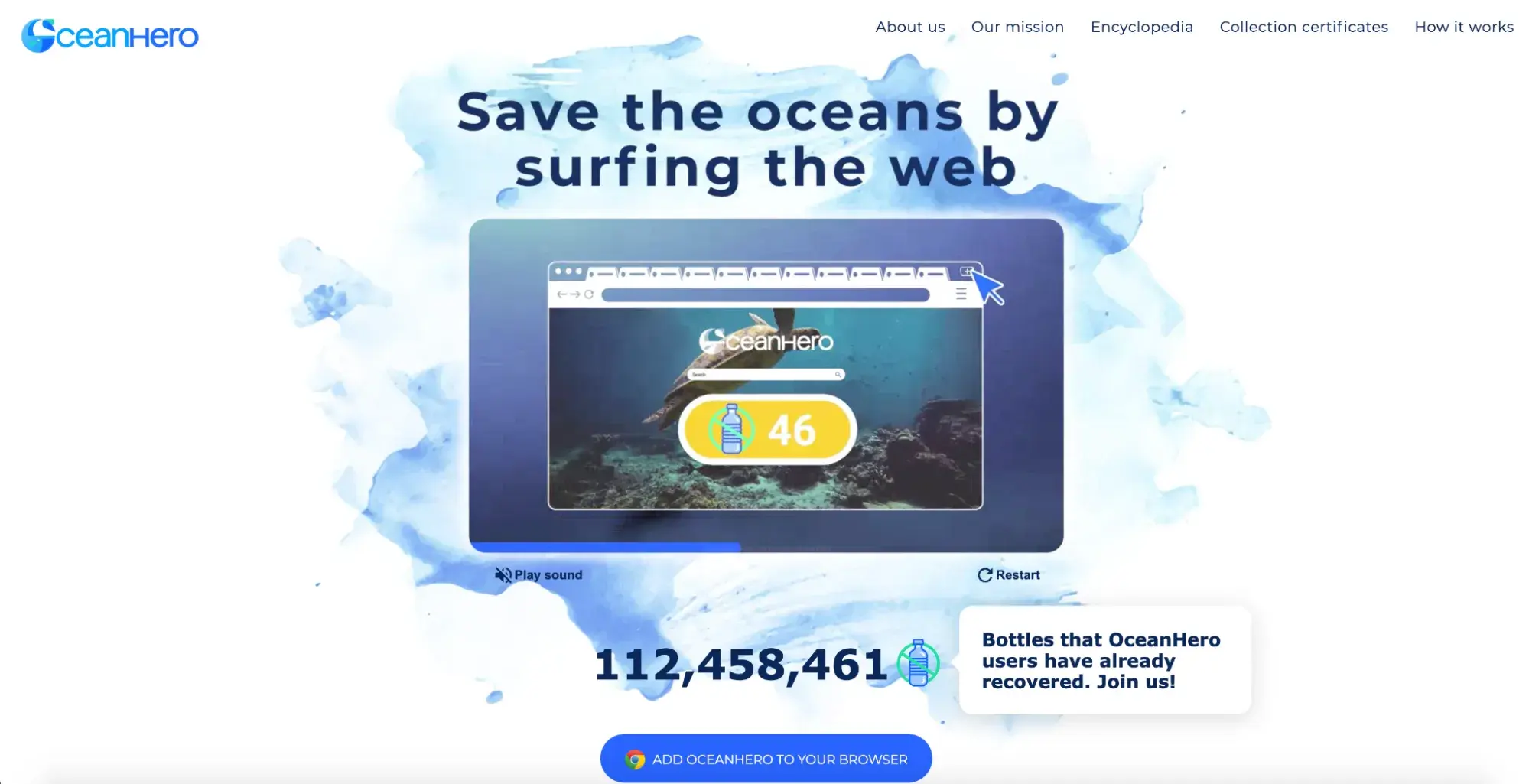
OceanHero is an incredible search engine with an environmental purpose. It generates revenue through search ads and donates the proceeds to organizations like PlasticBank who are dedicated to collecting plastic to clean up oceans.
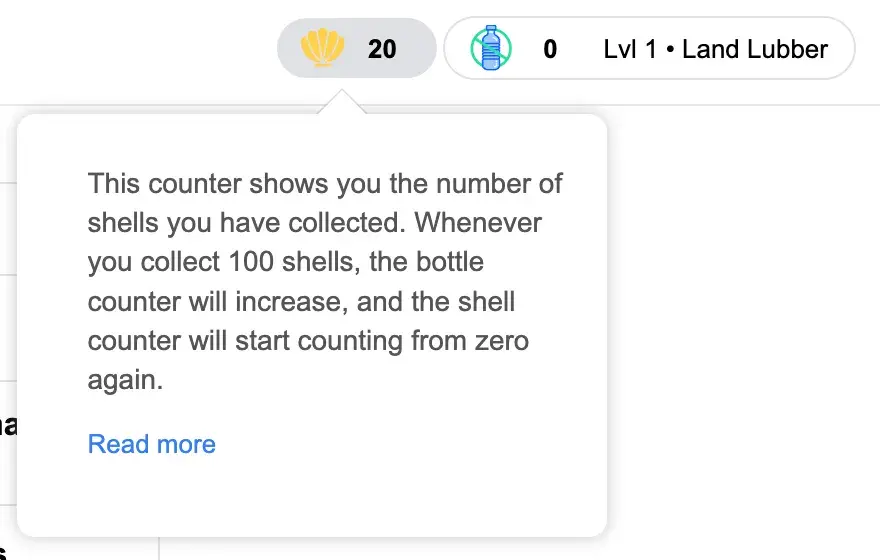
OceanHero turns searching into a challenge. You can work towards earning as many shells as possible. Once you’ve collected 100 shells, your bottle counter increases by one to reveal how many ocean-bound plastic bottles you’ve helped rescue.
On average, five searches or 17 new tabs in the browser extension contribute to recovering one plastic bottle.
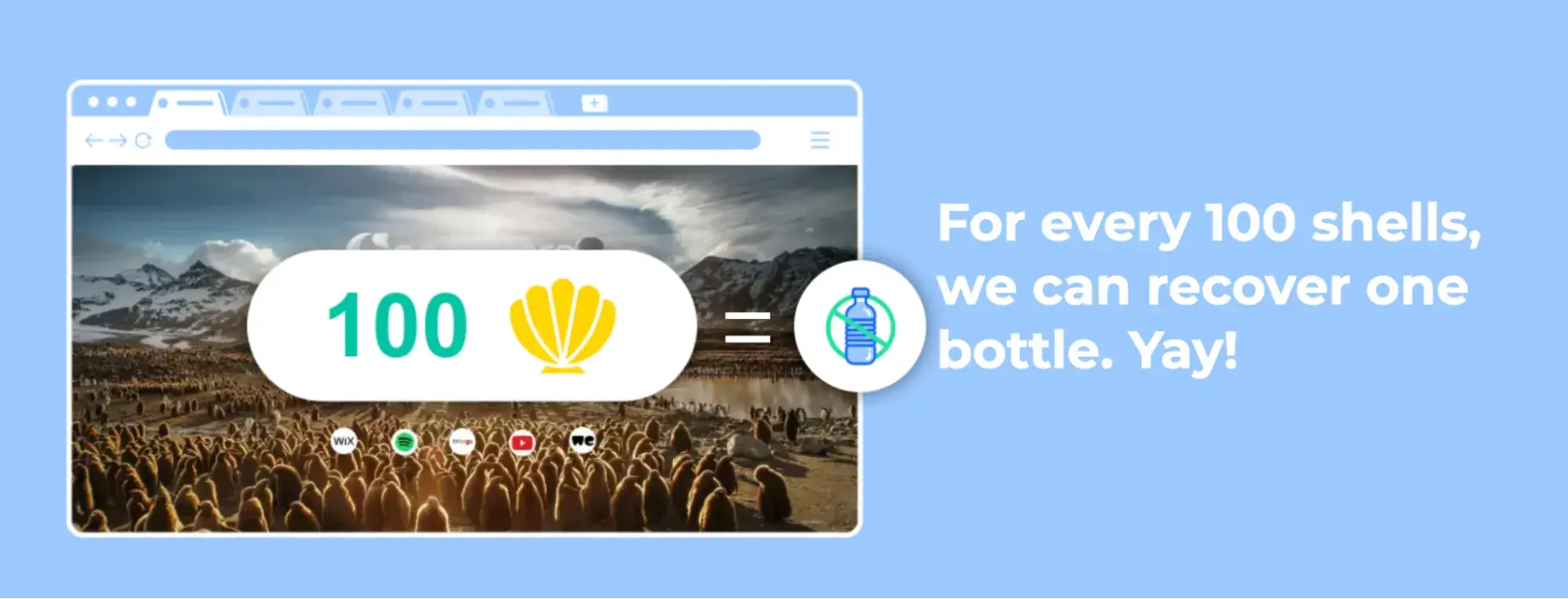
First, I had to add OceanHero as a Google Chrome extension.
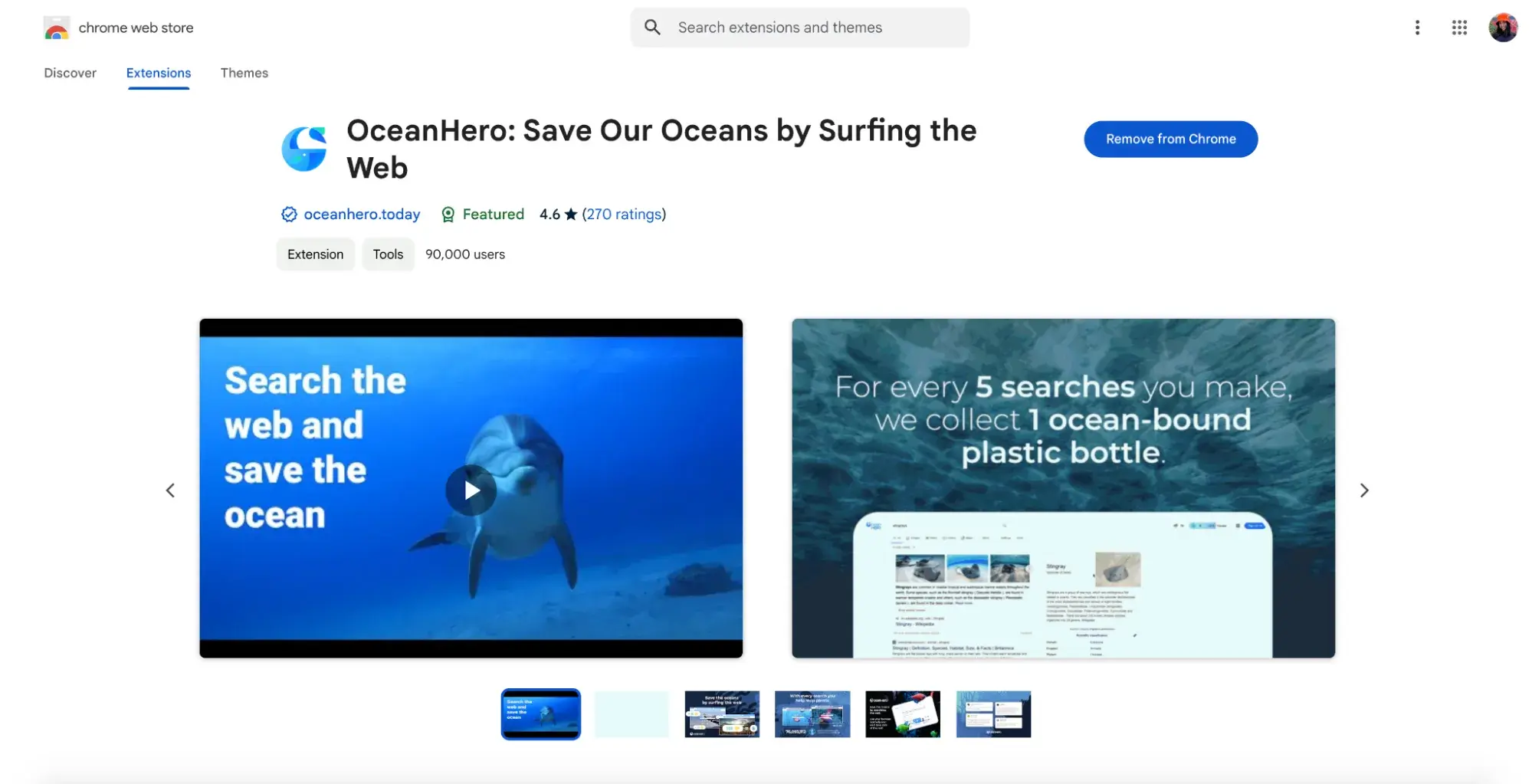
Then, I followed the instructions to begin using OceanHero as my primary search engine.
What I Like
- Since OceanHero gets added as a Google Chrome extension, it’s the most natural Google alternative. I can search queries directly in my Chrome search bar, and my browsing experience doesn’t change at all. My searches just get entered through OceanHero, rather than Google, making it a seamless transition.
- OceanHero has such an important purpose that is a joy to be a part of. I’m going to be searching various questions and prompts daily anyway, so I may as well contribute to some positive change while doing so!
- The idea of making ocean plastic reduction into a game by having users collect shells and bottles adds a fun, competitive edge to this search engine.
What I Don’t Like
- Having to add OceanHero as a browser extension may deter some folks from wanting to adopt it.
- Other than its strong environmental mission, OceanHero almost exactly resembles the Google searching experience, for better or for worse.
Pricing
- Free
8. Swisscows
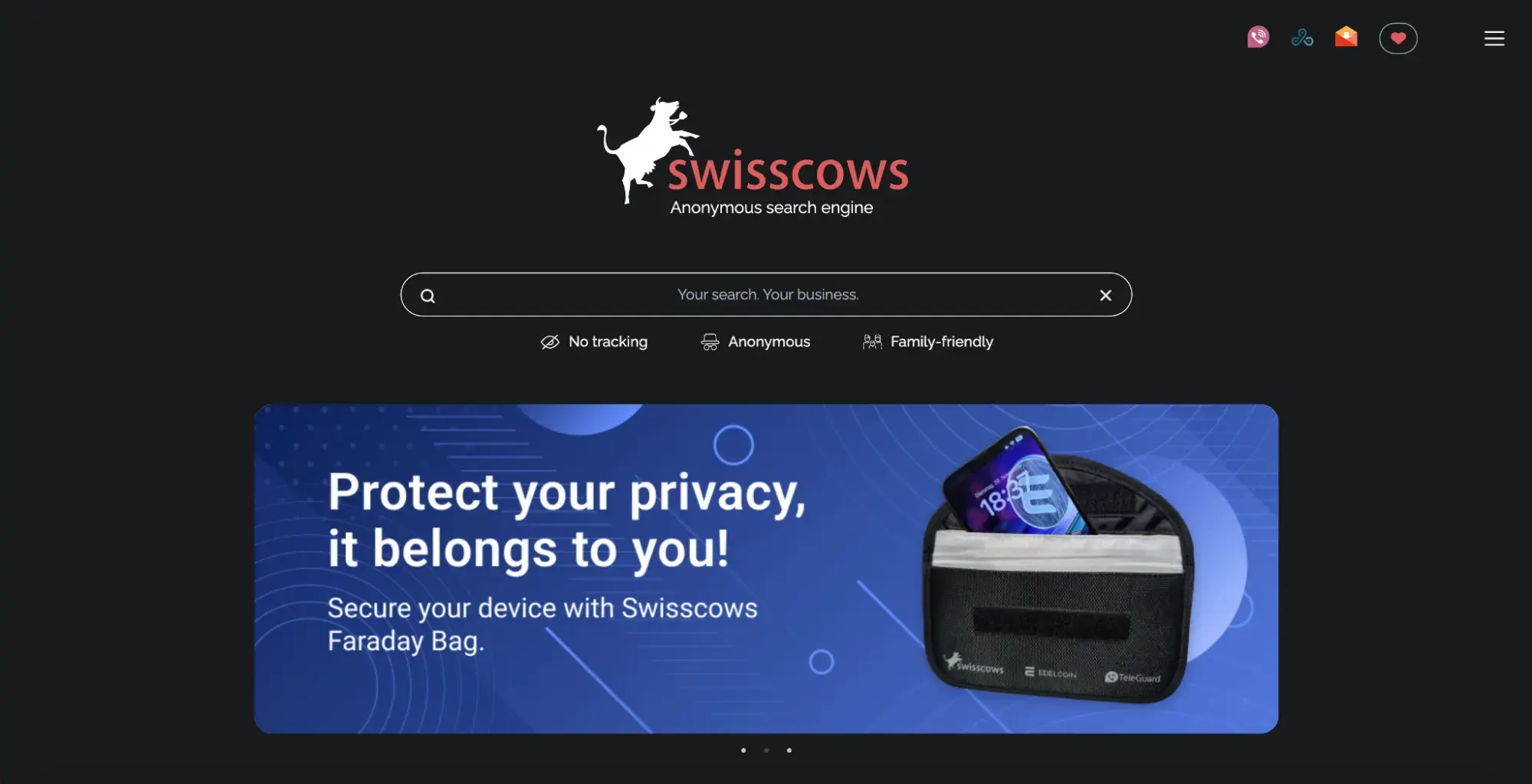
Swisscows is unique in that it boasts family-friendly content, so users can feel confident in allowing their kids to use the search engine freely. In addition, this search engine has a charitable edge.
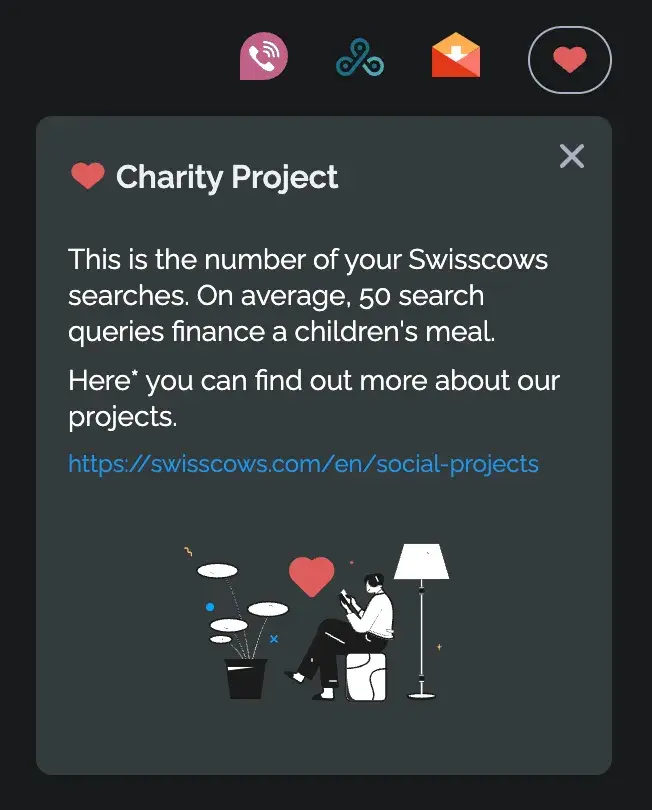
The heart icon at the top of the browser keeps track of a user’s number of searches. The search engine states that, on average, 50 searches help finance a meal for a child. You can read more about Swisscows’ social projects, impact, and donation opportunities here.
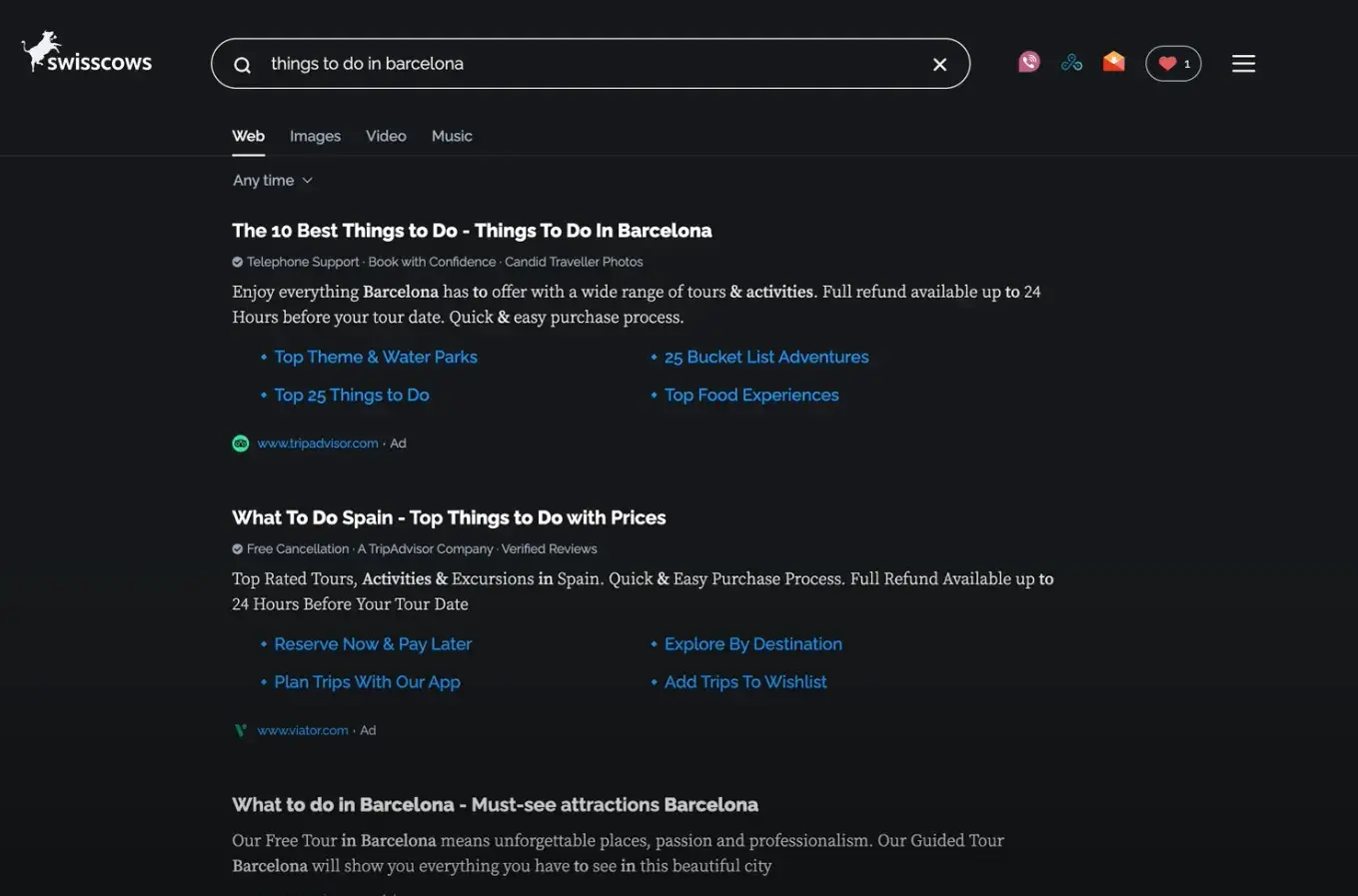
What I Like
- I originally expected Swisscows to have a kiddish appearance due to being family-friendly, but it looks like any other search engine on this list. This makes it more appealing for adults who want to use this platform as well as their kids.
- The social impact of Swisscows makes it a no-brainer to use. I get to search my numerous queries daily and know those random searches contribute to important social causes benefiting children.
- The search results are organized cleanly, with an icon photo to the left of the headline, a couple of lines of description, and, below that, a shortened URL, post date, and the ability to open up an anonymous preview with an AI-based description. This format is unlike any other I’ve seen and provides you with as much information upfront as possible.
What I Don’t Like
- I found this to be one of the slower page load times of the search engines I tested.
- If you also want an ad-free experience, this search engine does, unfortunately, include ads.
- I also found that the “Ad” labels are small and at the bottom of each link, rather than at the top like with Google, which can be misleading.
Pricing
- Free
6 Tips for Succeeding Off Google Search as a Brand
While I’ve gone over the pros and cons of using these eight search engines as a consumer, it’s equally important to know how best to operate them as a brand.
Read on for some of my tips on successfully optimizing for these Google alternatives.
1. Produce high-quality, engaging content.
It may seem obvious, but the most important part of your search engine strategy should be creating content worthy of a search. In such a crowded marketplace, with users having to decide between dozens of sources with near-identical information, it’s difficult to stand out without quality content.
Employ search engine optimization (SEO) to ensure you’re creating content around topics that users are interested in. And, while it’s important to incorporate those keywords, make sure the language on your websites, blog posts, or other platforms feels authentic and natural.
For instance, when I write my HubSpot blog posts, I integrate my opinions and experience, while still hitting keywords, which results in personalized and useful content. I also always write in my natural tone of voice to sound like my authentic self and not a robot.
2. Diversify your keyword strategy.
Speaking of keywords, it’s important to broaden the types of keywords referenced in your content. While it’s easier to plug single-word keywords into any piece of content, it can be more profitable to incorporate longer phrases.
Long-tail keywords are typically three or more words and have lower search volumes. However, they make up a larger percentage of searches when combined and are more likely to result in conversions, since the keywords are so specific.
3. Improve your search ranking with backlinks.
Backlinks are created when another website links to your website. As an example, this is now a backlink for Backlinko.
Backlinks are important as they can show users that your content is reputable. The best way to get backlinks is by giving them back to other trusted sources. Build important partnerships with brands for a mutually beneficial relationship.
4. Update your web experience.
As seen in this post, each search engine has a different appearance and format. This will impact how your content shows up in users’ search results. Therefore, when targeting a new search engine, you must update your content’s web experience.
For instance, some search engines like Kagi show the date of publication upfront in search results, which encourages me to refresh my content regularly so it appears recent and reliable.
Other search engines like Swisscows include a photo icon in search results, so I would want to confirm I have a high-quality, clear, relevant photo chosen alongside the URL.
5. Consider relevant, niche search engines.
I mentioned that there are search engines with special features and purposes, like OceanHero and Swisscows. It can be to your benefit to include search engines in your strategy if their niches align with your brand’s niche.
I work at Nickelodeon, so I’d assume our team has optimized our content for family-friendly search engines like Swisscows. If I were to work at a nonprofit or AI company, I’d similarly want to include search engines in those niches in my strategy.
6. Stay up-to-date on search engine changes.
While Google was not the first search engine, it was an early contender and unique because its founders, two PhD students from Stanford University, developed PageRank, an algorithm that listed sites in order of the number of links to them.
Since then, dozens of new search engines have emerged with different focuses, algorithms, and solutions to problems. It’s imperative, as a brand owner, to stay on top of this ever-changing landscape and accordingly update your SEO strategy.
After all, Google introduced its first AI system, RankBrain, in 2015. Less than ten years later, there are countless AI search engines and standard search engines with AI capabilities. Having an eye on trends and improving user experience will always be a necessity.
The Search for a New Search Engine
When diving into this post, I was aware of some of these non-Google search engines, but my mind is truly blown at how many options there are.
While Google still has more than 90% market share, other search engines can provide unique, individualized experiences for those willing to give them a chance.
In particular, my favorites from this list are Perplexity, which I’ve already integrated into my routine, and OceanHero.
I think both show how search engines can take the common human action of searching queries and take that to the next level to improve users’ lives or the greater world.
Google may seem like the easy, obvious choice, but there is a lot of value in incorporating some of these other search engines to better optimize your content for search.
![]()
What's Your Reaction?







![Best Times to Post on YouTube in 2025 [Research]](https://www.hubspot.com/hubfs/best-time-to-post-youtube.jpg)

![12 Web Design Best Practices & Guidelines for Usability in 2025 [+ Expert Tips]](https://www.hubspot.com/hubfs/website-design-1-20241121-4075840.webp)
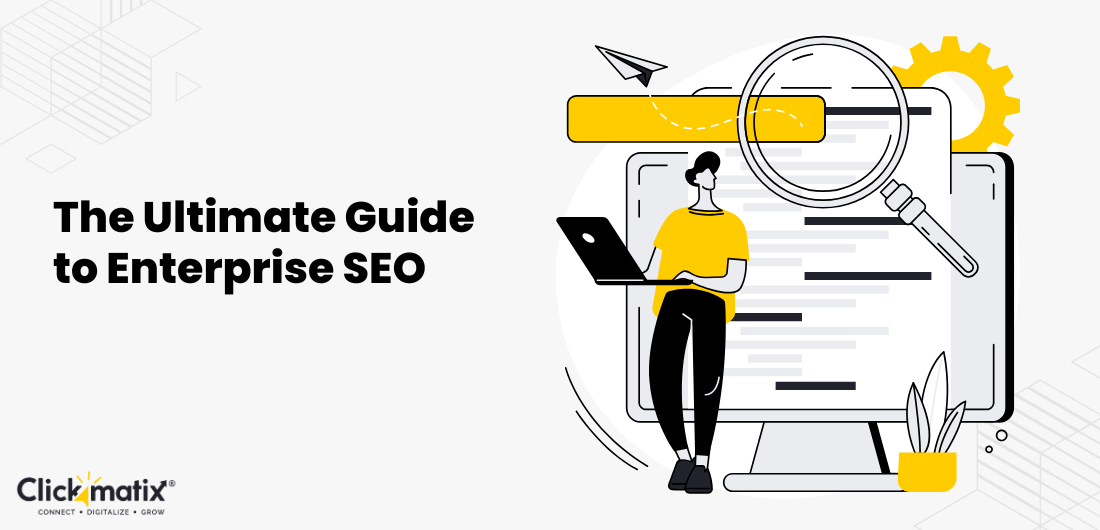




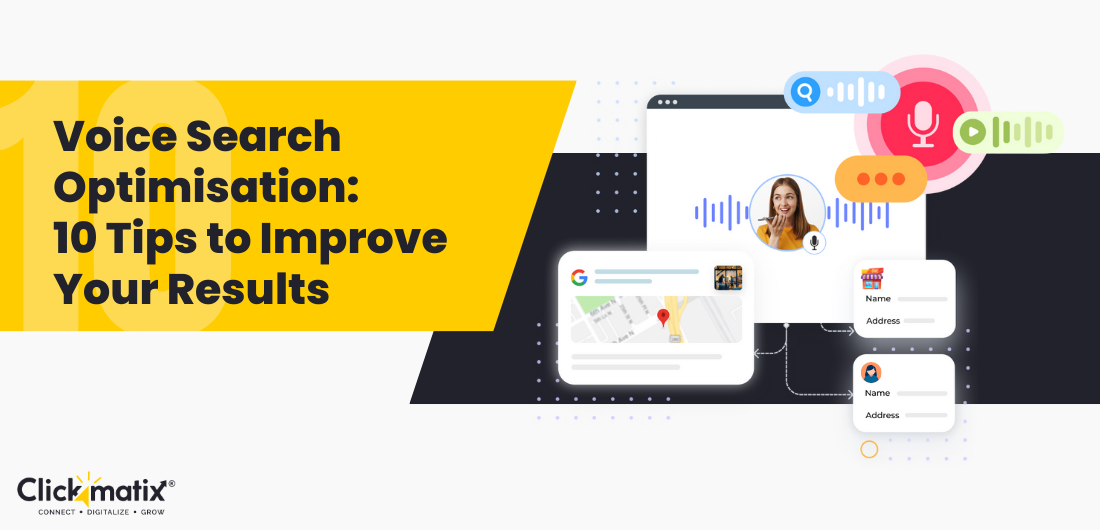

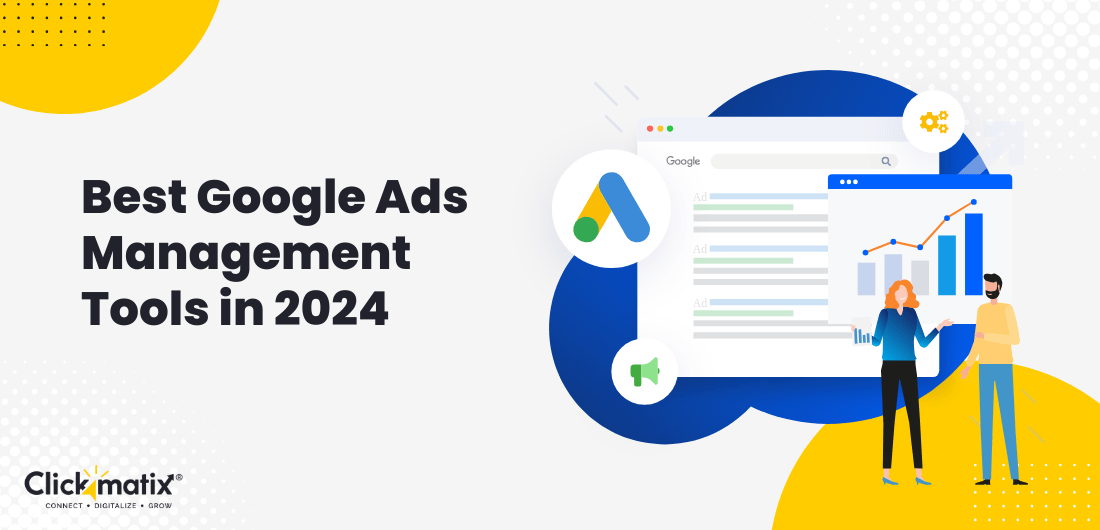






















































![Download Now: The State of U.S. Consumer Trends [Free Report]](https://no-cache.hubspot.com/cta/default/53/ebf9ec8e-a468-455a-943e-80aa4e6be694.png)












